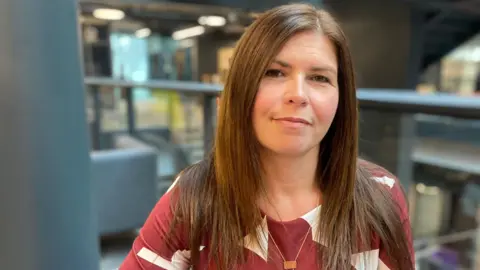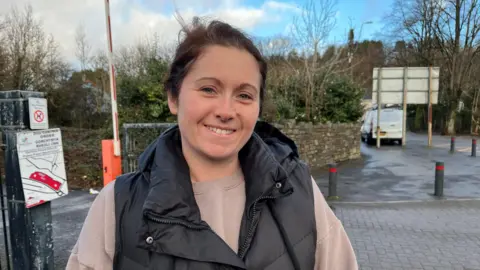'Unfair' to call parents into school to change nappies
Being called into school to change children's pull-ups and nappies is "unfair", parents have said.
A council in the south Wales valleys said teachers and school staff will no longer change pupils who have wet or soiled themselves due to "very high levels of pupils coming to school in nappies".
But a charity said it was "tantamount to abuse" to force or allow a child to sit in wet or soiled underwear until a parent or guardian can come in and change them.
Children can join a nursery class at school from the term after they turn three, and about one in four children are not toilet trained when they start in Wales and England, according to recent figures.
One union leader said they had heard anecdotes of children as old as eight not being fully toilet trained and missing lessons as a result.
Education bosses said there had been an increase in school-age children not being able to use the bathroom independently since the Covid-19 pandemic.
In a statement, Blaenau Gwent council said it should be the parent or carer's responsibility to ensure their child is toilet trained before starting nursery and primary school.
"The policy states that parents will be expected to go to school to change their child's nappies/pull ups," it added.
It also said the policy would not apply if there was a recognised medical need.
However some parents expressed concern that not all medical needs will have been recognised or diagnosed by the time children start school.
At what age are children toilet trained?
The NHS website says nine out of 10 three-year-olds are dry most days, while most four-year-olds are reliably dry during the day.

Laura Doel, national secretary of the NAHT Cymru union, said: "This is not isolated to just nursery and reception pupils.
"We have members telling us that children as old as seven and eight, who have no additional learning needs or medical conditions, are struggling with toileting.
"We applaud Blaenau Gwent council for being brave enough to take this step, and in fact we would encourage other local authorities, who are perhaps facing similar challenges, to follow suit."
Ms Doel added some schools had reached a "crisis point" and time spent changing children's nappies was "massively disruptive" to staff.

Outside one school in Tredegar, Blaenau Gwent, some parents were sceptical of the new policy.
"My daughter today wet herself in school and they were ringing us up – it's a bit of a pain really," said Daniel Derrick.
"We just had to come and get her early, just lucky today that I'm off work. Maybe if they'd given us a bit more time on [the policy], rather than just coming out with it, it would have been better."
Another parent, Stephanie Barry, said her daughter had been potty trained before starting school but her son, who is neurodivergent, was not.
"It should be case-by-case," she said.

Grandfather Gavin Wise said the policy was "unfair".
"If the kid's in school, that's what they're there for, to be looked after.
If they employed someone else to come in and do that for them, it shouldn't be a problem. I'd say it's part of the job."

Claire Armitstead of ASCL Cymru, which represents headteachers, said there had been a "huge increase" since the Covid pandemic in the number of children who need help going to the toilet.
She added the policy was not "parents against school" and concerns were around time rather than unwillingness to help.
"All over Wales there are a number of schools really struggling with this, because they have neither the money or the resource to keep supporting children in this way," said Ms Armitstead.
"If I have five teaching assistants in my school, and four of them are supporting toileting for children without additional learning needs, then they're not supporting for learning."
Eric, a children's bowel and bladder charity, said it was concerned parents were being "shamed" for not having toilet trained their children.
"These knee-jerk reactions miss a crucial point - when things go wrong, there are far fewer opportunities now for parents to get help," said Juliette Rayner, the charity's chief executive.
"The knock-on effects of the pandemic and cuts to essential children's services in recent years have contributed to this issue and, if not addressed soon, it could have serious implications for children's health and education.
"Children affected by bowel and bladder issues need to be treated quickly, while the problems are still at an early stage, and before they become a lifelong burden."
She said calls to the charity's helpline had trebled in the past five years, and said it should not be left to charities and schools to pick up the pieces.
"It's time to stop blaming parents, ensure that local services have adequate resources to support toilet training, and a bladder and bowel provision in place to help those who experience problems – before it's too late."
The charity's website said it was "tantamount to abuse" to allow a child to sit in wet or soiled underwear.
